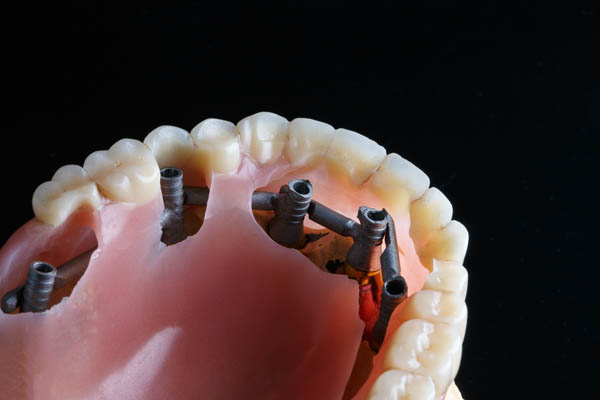How Long Does the Procedure for Implant Supported Dentures Take?

Implant supported dentures are a popular tooth replacement treatment option that combines dental implants and dentures. Because they combine two already existing treatments, individuals tend to experience extremely positive results, meaning little to no failure and full functionality of the oral cavity.
When considering implant-supported dentures, a popular question that arises is how long the procedure takes. Continue reading to find out! This information may be helpful to someone considering different tooth replacement options.
Implant-supported dentures: the timeline
Below is an overview of how long an implant-supported dentures procedure takes. It is also good to know that there are a few steps involved in the entire process.
The placement procedure
Getting implant-supported dentures does require a few steps, with the first being the placement of the dental implants. Dental implant placement requires a minimally-invasive procedure. On average, the patient should expect this procedure to take anywhere from 90 minutes to two hours, depending on the number of implants placed and how viable the jawbone is.
In some instances, the placement procedure may not be the first step. Some individuals may not have enough viable jawbone, meaning there is not enough density for implants to live. In this case, an additional step would be required to allow for a bone graft to take place. This procedure may take a couple of hours as there are two steps, with the first being removal of bone from somewhere else in the body, and the second being the actual placement in the jaw. After the bone graft, there will be a few weeks of healing. Once enough bone is added to the jaw, the dental implants can be successfully placed.
Afterward
After the dental implants are placed, there is a period of healing required. Unlike other procedures, dental implants do take up to a few months to properly heal. This is because the bone has to accept the implant and allow for fusing to take place. Fusing is referred to as osseointegration and it is a crucial step in the implant-supported dentures process.
In the particular case of implant-supported dentures, osseointegration may take up to three to four months. The length of time depends on the patient's ability to heal, as well as the number of implants placed, which in this case, would most likely be four to six.
Once the dental implants have fully fused, the patient will return to the dentist to be fitted for the dentures, which can take a couple of weeks to get back from the dental lab. Finally, the dentures will be attached to the dental implants via abutments, which are small metal connectors.
Find out more
When considering tooth replacement with implant-supported dentures, it is highly advised to consult with a dentist. Not everyone is a good candidate for the procedure, which is why a full evaluation will be necessary. During the evaluation, the dentist can answer questions and address concerns about the procedure or the process. To find out more or to get scheduled for a consultation, reach out today.
Request an appointment here: https://alaskaadvanceddentistry.com or call Alaska Advanced Dentistry at (907) 522-3633 for an appointment in our Anchorage office.
Check out what others are saying about our dental services on Yelp: Implant Supported Dentures in Anchorage, AK.
Recent Posts
If someone is missing teeth, it is imperative to replace them as soon as possible. Implant-supported dentures are one option for replacement. These fixed dentures allow for an effective and natural bite, which means that the wearer can eat normally. Unlike traditional dentures, implant-supported ones are attached to the jawbone, which prevents bone loss and…
All-on-4 is a dental restoration option for people who have lost most or all their teeth. This option involves supporting dentures with four implants placed inside the jawbone. The convenience of the entire procedure makes it an appealing choice for people who want implant-based restoration. To determine a patient’s candidacy for the procedure, the dentist…
The term All-on-4® refers to a more convenient alternative than conventional dentures. It involves installing dental implants into the patient’s jaw to serve as the base for a special type of dentures that are fixed in place.Traditional dentures are the most affordable way to replace missing teeth, but they have issues like poor stability. This…
Countless patients around the globe wear dentures, and they will face the need for denture repair at some point. There is no reason to fear needing any repair done on your dentures. When you first were fitted, your dentist went over the proper care and gave you tips and suggestions on how to keep them looking…


